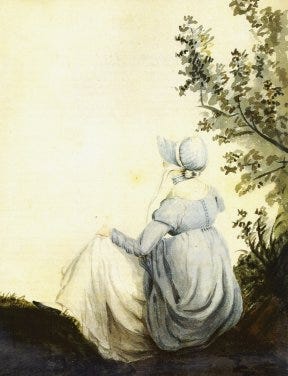In the mid-1990s there was a wave of TV and film adaptations of Jane Austen’s novels, most notably Emma Thompson’s Sense and Sensibility (gorgeously directed by Ang Lee), the BBC’s Pride and Prejudice, and Amy Heckerling’s film Clueless (a modern version of Emma). Those of us who were already Austen devotees responded mostly positively to these interpretations and welcomed the new, broader appreciation of the writer whom we held to be the finest novelist in the English language. Not only did people watch these adaptations: they watched them over and over again, as a kind of therapy. The BBC Pride and Prejudice especially, perhaps because of its length or the presence of its charming lead actors Colin Firth and Jennifer Ehle, became an early example of binge-worthy television. Tough week at work? Watch Pride and Prejudice. Bad breakup? Watch Pride and Prejudice. Got the flu? Watch Pride and Prejudice.
There was nothing that it couldn’t cure.
This phenomenon, on a larger scale, reflected what many of us Austenphiles were already doing: reading the novels over and over and never getting tired of them. One friend of mine reads all six of the major novels every summer, and I’m not far behind her in my tendency to return to them repeatedly.
It’s not just that the novels are comfort food or reliable sources of entertainment. It’s also that every time you read them, more and more of their richness will emerge—sentences that you want to read multiple times out loud in order to inflect them in different ways, instances of devastating wit that never fail to surprise, even if you have memorized them, and characters who we feel we know so well that we can enter their consciousnesses. These aren’t just feel-good rom-coms. They are magnificent, transformative reading experiences.
And the amazing thing is that in this age of doomscrolling and TikTok, these novels can still be transformative and can hold the attention of young undergraduates. She casts a spell with her prose technique. This is why Austen is so great to teach. I rarely swear in class, but when I demonstrate to students how Austen makes use of free-indirect style (which she essentially invented, by the way) to move in and out of, for example, the mind of Emma Woodhouse, I pause and look around. “You think Jane Austen is all cream teas and lace? Jane Austen—f*****g genius.”
And this is why I greatly appreciate the Stack of the Week, which is entirely dedicated to the f*****g genius of Jane Austen: The Austen Connection by
. Our guide to Austen describes herself as “a public radio-producer and journalism professor who’s assigned myself the Austen beat.” Her readings of Austen are unfailingly fresh and insightful, and if you love Austen, you will love this stack. And if you don’t love Austen, then what is wrong with you?Here is a superb sample post, her most recent, which uses bell hooks’s definition of love to consider Austen’s works through a new lens. I would never have thought to put these two together, but it works beautifully, to the point that I’m going to borrow the idea for teaching purposes (duly citing
, of course).I’ll be back on Wednesday with Part Six of the “Clapping Back to Misogyny Series.” Until then, take Emma off the shelf and read it again, and watch the BBC Pride and Prejudice (for your health), and read The Austen Connection.
Thanks for reading, from my fancy internet quill to your fancy internet notebook.








Sir, your words pierce my soul. I thought I was the only one who retreated to bed with a cup of tea and a good Austen film adaptation when I have a bad day or the flu. Most recently it was Amanda Root and Ciaran Hines in Persuasion. Austen definitely cures everything.
The Austen Connection is my favorite Substack. It’s genius! I’m always enriched and surprised. Might I also suggest “That Thing About Austen” podcast. They do a deep dive into a single line or item or location into one of the books (e.g. why is the horse Willoughby tries to give to Marianne named Queen Mab? Or, that thing about Gower’s skin cream). Like The Austen Connection it brings new insight to the books.